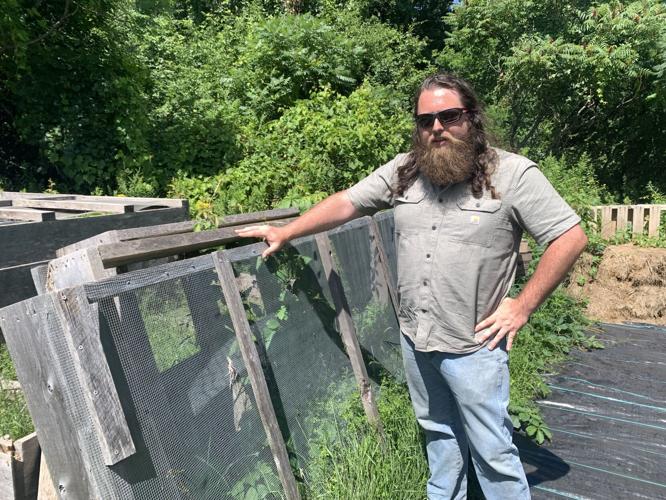Lifestyle
Vermont Veterans’ Home Launches Incubator Farm Initiative

A new initiative at the Bennington Veterans’ Home is set to empower veterans through agriculture by establishing an incubator farm. This project will soon begin searching for a veteran to serve as the first farm manager. Located on 12 acres at the Home, the farm aims to provide hands-on training, market connections, and support, ultimately enhancing the local food system while assisting veterans in their transition to farming.
Michael Fernandez, the district manager of the Bennington County Conservation District, is leading the effort. Preliminary work on the site has already begun, including the removal of invasive plants and the establishment of a small composting operation. On Wednesday, Fernandez and Bennington Community Development Director Shannon Barsotti conducted a tour of the property to showcase the progress made thus far.
Federal funding has played a crucial role in the development of this project. U.S. Senator Peter Welch secured $110,000 for various agriculture-related initiatives, which will support the incubator farm. Although the project is starting small, plans are in place to hire a part-time farm manager, with the first cohort of veteran farmers expected to begin training in spring 2024. The composting operation is designed to provide a continuous income source for the cooperative throughout the year.
Despite challenges, including delays caused by a federal funding freeze that impacted workforce availability, Fernandez remains optimistic. He noted the support received from Suburban Propane, which provided timely donations and assistance in building compost bins.
While the farm will not compete in the broader market, it will focus on providing services to local institutions and supporting other farmers. Fernandez emphasized the importance of leveraging funds effectively, such as utilizing state and federal cost-share programs to build infrastructure like high tunnels and raised beds.
Infrastructure and Community Benefits
The incubator farm will feature three distinct fields, each serving a different purpose. The first field, offering a view of the Bennington Monument, is designated for annual crops. Plans include installing high tunnels that provide a protective environment for warm-season crops like tomatoes and peppers, extending the growing season while minimizing disease risks.
The second field, currently housing the composting operation, has been prepared for air pruning beds, which are essential for the agroforestry plan. These beds help prevent root-binding and facilitate tree growth, meeting federal requirements for planting. The Yellow Bud Farm in Massachusetts has donated these beds, enabling the district to reduce costs associated with tree growth for funded projects.
Fernandez expressed enthusiasm for the project’s educational component, which will extend to local schools and the wider community. He described the farm as a “living laboratory” that incorporates principles of sustainable agriculture promoted by organizations such as the USDA and the UN World Food Program.
Supporting Veterans’ Health and Well-Being
A significant aspect of the incubator farm is its potential impact on the mental and physical health of veterans. Studies indicate that exposure to nature and working lands can be beneficial for those dealing with trauma and PTSD. Barsotti highlighted the importance of this initiative, noting that even veterans who do not work directly on the farm can participate by visiting and engaging with the activities.
Melissa A. Jackson, Chief Executive Officer of the Bennington Veterans’ Home, expressed support for the project, stating that the Board of Trustees agreed to lease the land for the incubator farm to align with the Home’s strategic goals. She noted that veteran farming programs offer both therapeutic and economic benefits, providing pathways to self-employment and skills development.
Importantly, Jackson pointed out that this initiative marks a return to the Home’s historical roots, as it originally operated as a working farm for Civil War veterans when it opened in 1884. By supporting the incubator farm, the Veterans’ Home aims to expand services for veterans beyond long-term care, cultivating hope, healing, and opportunity for those who have served.
As the incubator farm begins its journey, the community looks forward to its growth and the positive impact it will have on veterans and the local agricultural landscape.
-

 Health3 months ago
Health3 months agoNeurologist Warns Excessive Use of Supplements Can Harm Brain
-

 Health3 months ago
Health3 months agoFiona Phillips’ Husband Shares Heartfelt Update on Her Alzheimer’s Journey
-

 Science1 month ago
Science1 month agoBrian Cox Addresses Claims of Alien Probe in 3I/ATLAS Discovery
-

 Science1 month ago
Science1 month agoNASA Investigates Unusual Comet 3I/ATLAS; New Findings Emerge
-

 Science4 weeks ago
Science4 weeks agoScientists Examine 3I/ATLAS: Alien Artifact or Cosmic Oddity?
-

 Entertainment4 months ago
Entertainment4 months agoKerry Katona Discusses Future Baby Plans and Brian McFadden’s Wedding
-

 Science4 weeks ago
Science4 weeks agoNASA Investigates Speedy Object 3I/ATLAS, Sparking Speculation
-

 Entertainment4 months ago
Entertainment4 months agoEmmerdale Faces Tension as Dylan and April’s Lives Hang in the Balance
-

 World3 months ago
World3 months agoCole Palmer’s Cryptic Message to Kobbie Mainoo Following Loan Talks
-

 Science4 weeks ago
Science4 weeks agoNASA Scientists Explore Origins of 3I/ATLAS, a Fast-Moving Visitor
-

 Entertainment4 months ago
Entertainment4 months agoLove Island Star Toni Laite’s Mother Expresses Disappointment Over Coupling Decision
-

 Entertainment3 months ago
Entertainment3 months agoMajor Cast Changes at Coronation Street: Exits and Returns in 2025









